Related Research Articles
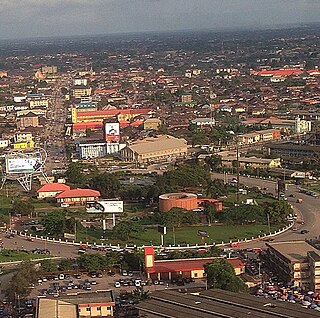
Benin City is the capital and largest city of Edo State, southern Nigeria. It is the fourth-largest city in Nigeria according to the 2006 census, after Lagos, Kano, and Ibadan. It is situated approximately 40 kilometres (25 mi) north of the Benin River and 320 kilometres (200 mi) by road east of Lagos. Benin City is the centre of Nigeria's rubber industry, and Palm oil production is also a significant industry.

The Oba of Benin is the traditional ruler and the custodian of the culture of the Edo people and all Edoid people. The then Kingdom of Benin has continued to be mostly populated by the Edo.
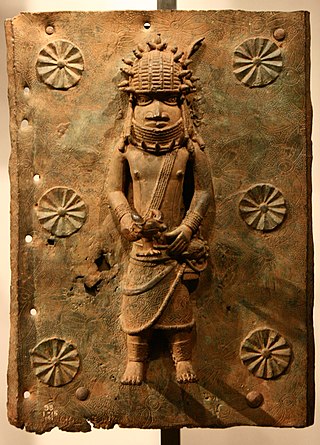
The Benin Bronzes are a group of several thousand metal plaques and sculptures that decorated the royal palace of the Kingdom of Benin, in what is now Edo State, Nigeria. Collectively, the objects form the best examples of Benin art and were created from the fourteenth century by artists of the Edo people. The plaques, which in the Edo language are called Ama, depict scenes or represent themes in the history of the kingdom. Apart from the plaques, other sculptures in brass or bronze include portrait heads, jewelry, and smaller pieces.

Edo, officially known as Edo State, is a state in the South-South geopolitical zone of the federal republic of Nigeria. As of 2022, the state was ranked as the 22nd most populous state (4,777,000) in Nigeria. The estimated state population is around 4,777,000 in 2022. Edo State is the 22nd largest State by landmass in Nigeria. The state's capital and largest city, Benin City, is the fourth largest city in Nigeria, and the centre of the country's rubber industry. Created in 1991 from the former Bendel State, it is also known as the heart beat of the nation. Edo State borders Kogi State to the north for 133 km and across the Niger River for 81 km to the northeast, Anambra State to the east for about four km across the Niger River, Delta State to the southeast and south for 350 km, and Ondo State to the west.

Esigie, originally known as Osawe, was the son of Oba Ozolua, who reigned in the late 15th century, and his second wife, Queen Idia. He was the sixteenth Oba who ruled the medieval Benin Kingdom, now Benin City, Edo State, Nigeria from c. 1504 – c. 1550. Works of art commissioned by Esigie are held in prominent museums including the Metropolitan Museum of Art and the British Museum.
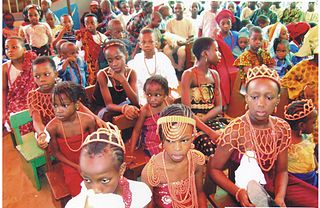
The Edopeople, sometimes referred to as the Bendel people, are an Edo-speaking ethnic group. The Edo tribe who predominantly reside in 8 southern local government areas of the State of Edo, Nigeria, are known as 'ÉDO'. They are speakers of the Edo language and are the descendants of the founders of the Benin Kingdom Ogiso Igodo. They are closely related to other southern Nigerian tribes, such as the Esan, the Etsakọ, the Isoko, the Igbo, and the Urhobo.

Uromi is a city located in north-eastern Esan, a sub-ethnic group of the Edo people in Edo state, Nigeria. At various points in Uromi's history, the city and people have been an important part of the Benin Empire.
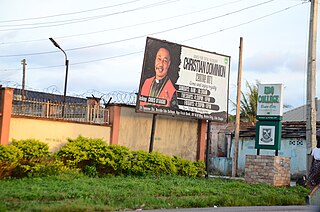
Edo College is a secondary grammar school in Benin City, Nigeria, the oldest in the Mid-Western Region. It was established in February, 1937 and started as the Benin Middle School with forms, I, II and III. In April 1937, the school, with a total student enrollment of 76 pupils, moved from its temporary site at the old Government School, Benin City to a permanent site, the present Idia College premises. In 1973, the school further moved from Idia College premises to its present site along Murtala Mohammed Way, Benin City. Edo state in the federal Republic of Nigeria.

Ovia North-East is a Local Government Area of Edo State, Nigeria. Its headquarters are in the town of Okada.
Igueben is a local government area of Edo State, Nigeria. Its headquarters are located in the town of Igueben, which has an area of 380 km2 (150 sq mi) and a population of 69,639 according to the 2006 census. The postal code is 310.

Oredo is a Local Government Area of Edo State, Nigeria. Its headquarter is in Benin City. Its capital city is Benin City which also is the capital city of Edo State, Nigeria. Benin City is also the capital city of the Benin Empire. The Oba of Benin, Omo N'Oba Ewuare II's palace is located here. There are four major markets in Oredo Local Government Area; Oba market, New Benin market, New market and Ekiosa market.
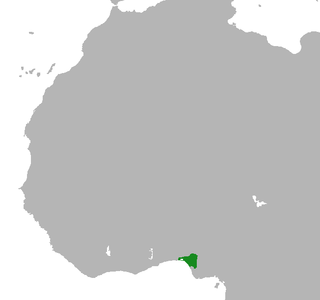
The Kingdom of Benin, also known as the Edo Kingdom or Benin Kingdom, is a kingdom within what is now southern Nigeria. It has no historical relation to the modern republic of Benin, which was known as Dahomey from the 17th century until 1975. The Kingdom of Benin's capital was Edo, now known as Benin City in Edo State, Nigeria. The Benin Kingdom was "one of the oldest and most developed states in the coastal hinterland of West Africa". It grew out of the previous Edo Kingdom of Igodomigodo around the 11th century AD, and lasted until it was annexed by the British Empire in 1897.

Ewu is a Nigerian town situated in Esan Central Local Government Area in the Edo State of Nigeria. The city, an Esan tribe, lies on 200 feet in the plateau region of central Edo State, 100 kilometres north of Benin City, the capital of Edo State, Nigeria.
The Okomu Forest Reserve is a forest block covering an area of 1081 km2 in Edo State, about 50 km west of Benin City, Nigeria. The Okomu National Park lies within the larger reserve, maintaining a small part of the forests that once covered the region as the last habitat for many endangered species.
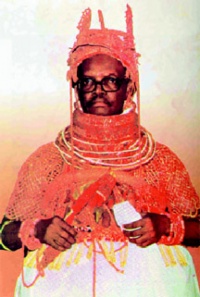
Erediauwa was the 39th Oba of Benin, traditional ruler of the Edo people in Benin City, Edo State, Nigeria. Formerly known as Prince Solomon Akenzua, Oba Erediauwa's full title was His Royal Majesty Omo n'Oba n'Edo Uku Akpolokpolo Erediauwa I. He was succeeded by Ewuare II.

Ọmọ n'Ọba n'Ẹdo Uku Akpọlọkpọlọ, Akenzua II was the thirty-seventh Oba of Benin reigning from 1933 until his death in 1978.
Unuamen also spelt Unuame is an ancient village community by Ovia river in Ovia North-East Local Government Area of Edo State, Nigeria. Unuame is about 15 kilometres (9 mi) from Benin City and 20 kilometres (12 mi) from Benin Airport. Unuame is one of the ancestral homes of Oba Esigie's maternal grandfather and home town to some group of Binis. The people of Unuame have remained loyal to the monarch since the establishment of the ancient Kingdom of Benin. Being a part of the Kingdom of Benin, Unuame is at the heart of the tropical rainforest in the southern part of Nigeria, way to the west of the delta of the Niger River and inland from the coast.
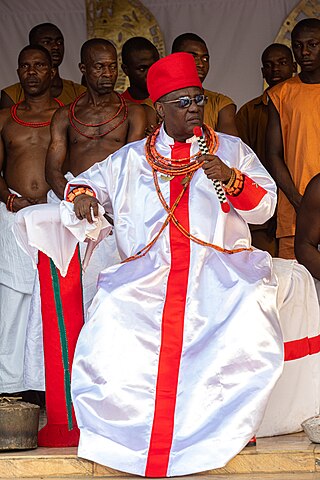
Ewuare II was crowned the Oba of Benin on 20 October 2016. He is the 40th Oba, a title created for the Head of State (Emperor) of the Benin Empire at some time between 1180 and 1300.
The Benin Moat, also known as the Benin Iya, or Walls of Benin, are a series of massive earthworks encircling Benin City in Nigeria's Edo State. These moats have deep historical roots, with evidence suggesting their existence before the establishment of the Oba monarchy. Construction began around 800 AD and continued until 1460 AD, involving large-scale manual labour and the repurposing of earth from the inner ditch to build the outer berm. Some traditional sources claim that these earthworks spanned approximately 16,000 kilometres (9,900 mi), enclosing about 6,500 square kilometres (2,500 sq mi) of land, but very little remains today.
The Ovia River or Osse River is a watercourse in Edo State, Nigeria, spanning approximately 120 kilometers through diverse terrain.
References
- ↑ Baker, Lynne R.; Oates, John F. (2019), Barnett, Adrian A.; Matsuda, Ikki; Nowak, Katarzyna (eds.), "Diversity and Conservation of Primates in the Flooded Forests of Southern Nigeria", Primates in Flooded Habitats: Ecology and Conservation, Cambridge: Cambridge University Press, pp. 315–325, ISBN 978-1-107-13431-7 , retrieved 2024-06-18
- ↑ "New Awakening on Gelegele Seaport". Vanguard News. 2018-05-31. Retrieved 2021-07-13.
- ↑ "Gelegele is an historical port of Benin Kingdom and there is no conflict of ownership". www.edoworld.net. Retrieved 2021-07-13.
- ↑ "Benin, Ijaw bicker over renaming of Gelegele community". Tribune Online. 2021-02-24. Retrieved 2021-07-13.
- ↑ "Gelegele: Half nude women chase away police as Ijaw escalate fight with Oba of Benin". Vanguard News. 2019-06-02. Retrieved 2021-07-13.
- ↑ "1983 Supreme Court Judgment On Gelegele Community Land Dispute; - Ijaws Solicit For Amicable Settlement". The Nigerian Post. 2021-03-20. Retrieved 2021-07-13.
- ↑ Perishable. "We Are Making Steady Progress on Gelegele Port Project - Edo Govt - TELL". tell.ng. Retrieved 2021-07-13.
- ↑ "China Harbour intensifies work on Gelegele Seaport". Latest Nigeria News, Nigerian Newspapers, Politics. 2018-03-30. Retrieved 2021-07-13.
6°09′15″N5°20′45″E / 6.15417°N 5.34583°E